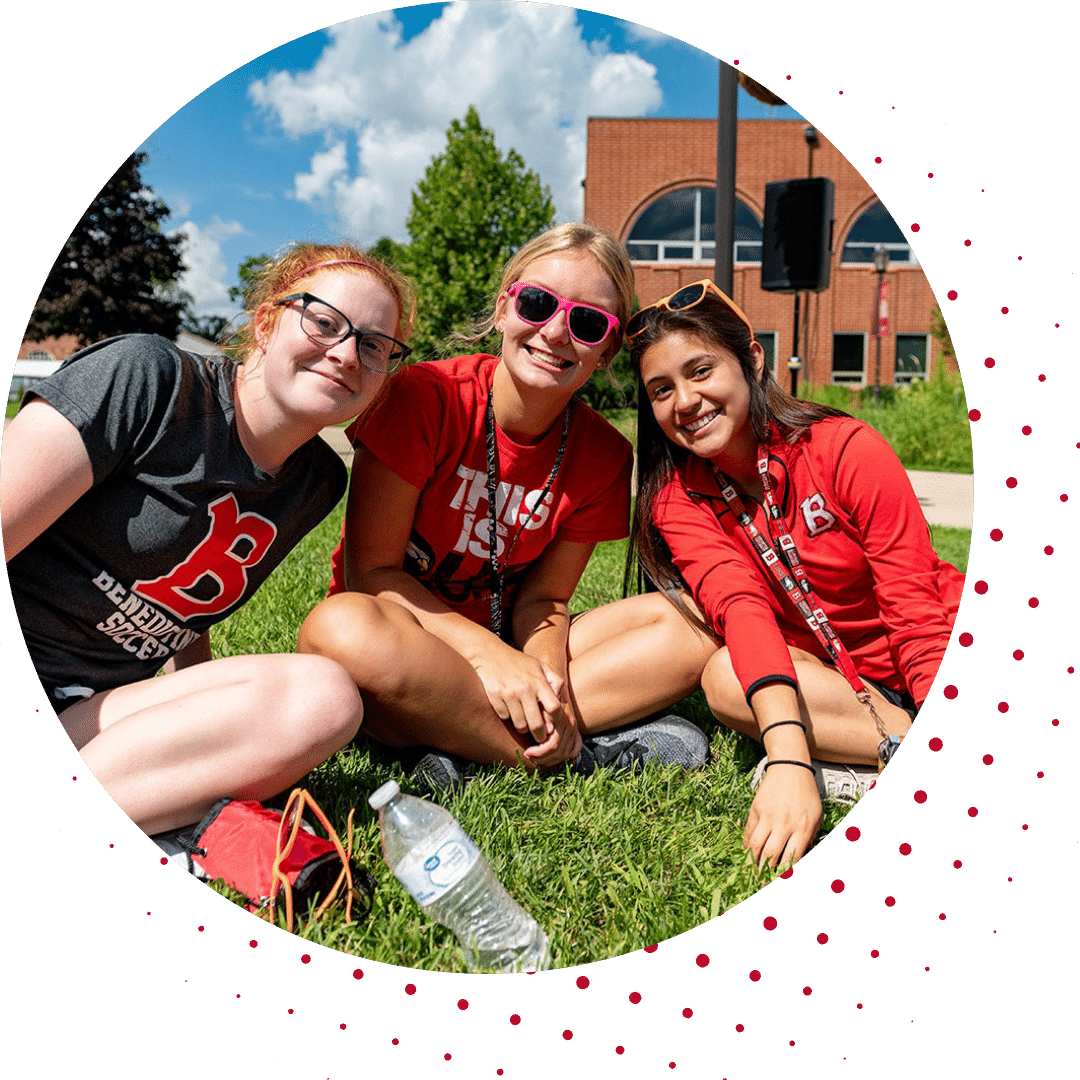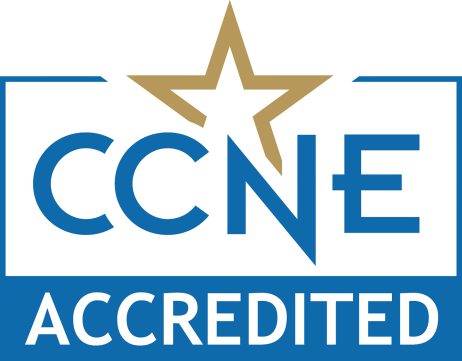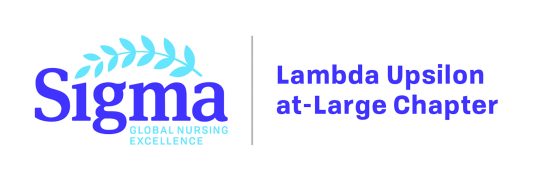MS in Nursing (MSN)
Overview
Undergraduate Programs
Graduate/Doctoral Programs
Online Programs
Resources
Elevate Your Nursing Career with Benedictine’s Online M.S.N.
As America’s healthcare evolves and the healthcare system becomes increasingly complex, the need for knowledgeable, collaborative nurse leaders grows ever stronger. To ensure continued quality patient care and to meet these changing demands, Benedictine University offers an online Master of Science in Nursing (M.S.N.) program designed to prepare registered nurses for leadership roles as either nurse educators or executive leaders.
The curriculum aligns with the American Association of Colleges of Nursing’s graduate education standards, emphasizing key areas such as person-centered care, population health, organizational leadership, healthcare technology, advocacy, interprofessional collaboration, and evidence-based practice. Combining foundational courses with concentration-specific coursework, the program can be completed in 24-26 months, with courses running eight weeks in a laddered sequence for maximum flexibility.
With the rising demand for nurses with advanced practice competence, an M.S.N. degree offers a clear advantage in today’s job market. Enjoy greater job security, higher earning potential, and the opportunity to excel in specialized roles that contribute to improved patient care. Invest in your future and strengthen your leadership in healthcare with Benedictine University’s M.S.N. program.
Benedictine University’s online M.S.N. program equips registered nurses with the skills and knowledge to lead and manage complex healthcare systems, embrace cutting-edge technology, advocate for best practices, collaborate effectively, and drive positive change. Whether pursuing a career as a direct care nurse educator or a nurse executive leader, graduates are prepared to make a significant impact on the future of healthcare.
- Why Study at BenU?
- Program Details
- Student Learning Outcomes
- Career Opportunities
- Courses
- MSN Frequently Asked Questions
Why Choose Benedictine University for your Nursing Education?
At Benedictine University, we believe in cultivating nurses who are not just skilled practitioners, but transformative leaders. Our program equips you to:
- Collaborate across disciplines: Apply your nursing knowledge alongside other professionals to foster innovative and effective clinical practice across the entire healthcare system.
- Deliver holistic care: Provide ethical and culturally sensitive care that prioritizes the individual and promotes positive health outcomes for diverse populations.
- Optimize healthcare delivery: Partner with other disciplines to ensure safe, efficient, and cost-effective care across the healthcare system.
- Shape the future of healthcare: Disseminate nursing knowledge and advocate for evidence-based practices through policy development and collaboration.
- Embrace technology: Utilize information and communication technologies to deliver high-quality healthcare services in line with best practices.
- Develop a lifelong learning mindset: Forge a strong nursing identity through professional development, clinical expertise, and a commitment to continuous learning and self-reflection.
Benedictine University’s nursing program fosters the knowledge, skills, and values you need to become a true leader in healthcare. Join us to make a difference in the lives of individuals and communities.
Learn from the Best: Expert Faculty at Benedictine University
Benedictine University’s Department of Nursing and Health boasts a distinguished faculty of experienced nurse leaders from across the nation. Each faculty member brings a wealth of expertise from diverse clinical, administrative, and educational backgrounds. Their dedication to research and teaching empowers them to guide and support you on your personal nursing journey.
Benefit from their expertise in:
- Clinical practice across various specialties
- Leadership and management roles in healthcare settings
- Nursing education and curriculum development
- Groundbreaking research to advance nursing practice
Benedictine University’s exceptional faculty are committed to your success, providing personalized guidance and mentorship every step of the way.
- Apply nursing knowledge in collaboration with other disciplines to foster professional and innovative clinical practice across the healthcare system.
- Provide holistic, ethical, and just person-centered care that supports the achievement of positive health outcomes across diverse cultures and populations.
- Engage in partnerships and interprofessional collaboration to optimize care, ensure safety, and manage costs across the healthcare system.
- Disseminate nursing knowledge and evidence-based practice focused on transforming healthcare including advocacy and policy development.
- Integrate information and communication technologies to deliver quality health care services in accordance with best practices and professional and regulatory standards.
- Create a sustained nursing identity through professionalism, advanced clinical expertise, a commitment to lifelong learning, and self-reflection.
Fulfilling Careers for MSN Graduates: Expand Your Impact Beyond the Bedside
An MSN degree opens doors to a wide range of exciting career opportunities in diverse fields and settings. Here are some potential career paths you could explore with your MSN degree:
Nurse Practitioner (NP): Provide primary and specialized healthcare, offering a rewarding blend of clinical practice and patient care.
Nurse Manager/Administrator: Lead and manage nursing teams, ensuring quality care and shaping the future of healthcare delivery.
Nurse Educator: Share your knowledge and passion for nursing, preparing future generations of skilled and compassionate professionals.
Clinical Nurse Specialist (CNS): Deepen your expertise in a specific area of nursing and provide advanced clinical care to patients with complex needs.
Clinical Research Coordinator: Contribute to groundbreaking research that improves patient care and advances nursing practice.
This list is not exhaustive, and the specific career opportunities available to you will depend on your interests, skills, and career goals. However, with an MSN degree, you will be well-equipped to navigate a diverse and rewarding career path within the healthcare field.
Here are some additional resources you may find helpful:
- American Association of Colleges of Nursing (AACN): https://www.aacnnursing.org/
- National Council of State Boards of Nursing (NCSBN): https://www.ncsbn.org/
- American Nurses Association (ANA): https://www.nursingworld.org/ana/
- Nurse.com: https://thenurseszone.com/
Here is an example of some courses you may take in the MSN program:
- Health Promotion and Interprofessional Collaboration
- Ethical and Culturally Competent Healthcare Professional
- Healthcare Policy and Advocacy
- Professionalism and Executive Career Development
- Advanced Nursing Practice: Clinical Immersion
Master of Science in Nursing courses (MSN):
How and when do I get started?
- Applications are reviewed on a rolling basis throughout the year. Request information or contact admissions at (630) 829-6300 for enrollment information.
Is this a full-time or part-time program?
- Students of the M.S.N. online program are required to take one class per session, which would be considered part-time. Depending on the concentration you choose, you will be required to complete either 12 or 13 sessions over the course of two years or two years and eight weeks.
How many sessions a year do you offer?
- To align with the demanding schedules of today’s professionals, Benedictine’s M.S.N. online program offers three opportunities to start courses per year in January, May and August. Request more information or contact a graduate advisor at (630) 829-6309 for the next start date.
When is the application deadline?
- The application deadline is 10 days prior to the start date of the program.
What kind of educational background is required for admission?
- You must have an earned bachelor’s degree in nursing from a regionally accredited college or university, with a minimum cumulative undergraduate GPA of 2.75.
What are the admission requirements?
- Bachelor of Science degree in Nursing (B.S.N.) from a regionally accredited college or university.
- Minimum cumulative GPA of 2.750 on a 4.000 scale
- Proof of license as a registered nurse (RN) in the United States.
- Official sealed transcripts from any and all previously attended colleges and universities
- One letter of recommendation from a professional reference who is familiar with the applicant’s competence in the practice of nursing and potential for successful graduate education
- Resume detailing your professional work experience
- Statement of Goals
- Maximum of two pages describing goals and rationale for pursuing a master’s degree in nursing. Must also include past nursing experiences that have prepared you to pursue a new role following completion of the program.
- Proficiency in word processing, email and library online searches.
- A score on the Test of English as Foreign Language (TOEFL) in accordance with the Graduate Catalog policy for those applicants where English is not their primary language.
Is there a thesis required?
- No. Benedictine’s M.S.N. online program does not require a thesis. A 140-clock-hour practicum is required.
How many total credits are required?
- The M.S.N. online program consists of 15 semester hours (five classes) of foundation courses, and an additional 24 semester hours (eight classes) for the Nurse Educator concentration or 21 semester hours (seven classes) for the Nurse Executive Leader concentration.
Which courses are required to complete the program?
- Regardless of which concentration you choose, you will be required to complete five Foundation courses: NRHL 5501—Health Promotion and Interprofessional Collaboration, NRHL 5502—Ethical and Culturally Competent Healthcare Professional, NRHL 5503—Evidence-based Nursing Practice: Research and Process Improvement, NRHL 5505—Healthcare Policy and Advocacy and NRHL 5506—Quality Improvement & Safety in Healthcare Systems. Learn more about the additional course that you will need to take in order to complete your concentration.
Do you accept transfer credit?
- After acceptance, students can apply to transfer up to 12 semester credit hours. Courses must have been completed with a grade of “B” or higher taken in the past five years from a regionally accredited school with equivalent content to courses in the Benedictine M.S.N. curriculum.
How long will it take me to complete my degree?
- Most adult students who work full-time take one online course per eight-week session. The M.S.N. online program offers six academic sessions per year, meaning most students take six courses per year. Twelve courses are required for the Nurse Executive Leader concentration as well as the M.S.N. degree associated with the dual M.S.N./M.B.A. Thirteen courses are required for the Nurse Educator concentration. On average, the M.S.N. online program is designed to be completed in two years or slightly longer.
Is Benedictine University accredited?
- Yes, Benedictine University is accredited by the Higher Learning Commission of the North Central Association of Colleges and Schools. The master’s degree program in nursing at Benedictine University is accredited by the Commission on Collegiate Nursing Education, 655 K Street NW, Suite 750, Washington, DC 20001, 202-887-6791.
Is there a residency requirement?
- No, there is no residency requirement. The M.S.N. online program allows you to learn anywhere you have access to the internet by faculty with experience in a wide range of nursing specialties and leadership and education expertise. Online courses are delivered via the Web through a user-friendly online learning platform. This powerful educational technology allows you to get course assignments, ask questions to faculty and other students, and participate in critical analytical discussion with colleagues around the world.
Do I need a computer?
- Yes. You will need a computer with high-speed internet access to successfully complete the requirements for the degree.
What is the main software that I need to get started?
- You must have Microsoft Office installed on your computer, and your Web browser should be Google Chrome or Firefox. In addition, there are some free support programs that you can configure to ensure you are able to view the media products used to support your learning, such as Windows Media Player, QuickTime, Compression/Zip Utility, Adobe Flash and Adobe Acrobat.
- As a registered student, you are entitled to download and install the full MS Office Suite for free on up to five personal devices. The five installs include devices such as computers, laptops, tablets (iPad, etc.), and smartphones. Click here for more information on software purchase and technical support.
How much do I need to know about computers to succeed in this program?
- The courses are designed to be user-friendly for those who have limited computer skills. All students complete an online orientation that ensures they have the basic skills required to successfully navigate the course.
Is there technical support?
- Yes. Technical support is available 24 hours a day, seven days a week through BenSupport, which is easily reached through a toll-free number.
What is the career outlook for graduates of this program?
- Many Magnet hospitals now require a percentage of nurses on staff to have earned master’s degrees. In turn, even non-Magnet hospitals are adopting this requirement in the hopes of achieving Magnet status and improving patient care. With your advanced nursing degree, you’ll have a clear advantage in competing for a job and positioning yourself for advanced nursing careers. See the “Careers” tab in this section for more information.
Why is Benedictine University my best choice for the online M.S.N?
- Our online Master of Science in Nursing program prepares you to tackle the most relevant and pressing issues facing healthcare and nursing today, while offering you expert faculty and staff who provide personalized support every step of the way. As a student at Benedictine University, you work with a Student Services Coordinator who will be there to help you with anything you need, from your first week of class right through to graduation.
Is advising available for all students?
- Yes. Students can set up a telephone appointment to speak with an advisor whenever assistance is needed.
If you have additional questions, please contact the Associate Director of Admissions – Graduate & Doctoral at (630) 829-6309.
Post Master’s Nurse Educator or Nurse Executive Leader Certificate
The Nurse Educator and Nurse Executive Leader Certificates are designed for professional registered nurses who possess a Master of Science or higher degree in nursing and are looking to build upon current expertise to gain advanced knowledge and skills in nursing education or nursing management and executive leadership.
Nurse Educator Certificate
This program empowers you to become a skilled and adaptable nurse educator, prepared to inspire and guide diverse learners in various settings. Develop expertise in instructional design, teaching methods, curriculum development, and evaluation, all with a focus on real-world application.
Nurse Executive Leader Certificate
This program equips you to excel in complex healthcare settings by developing essential leadership skills. Master effective communication, conflict resolution, strategic thinking, financial management, and resource allocation to become a true leader in the nursing field.

MSN Program Goals
All Inclusive Community
Build upon a baccalaureate foundation of the arts, sciences, and humanities to develop professional nurses who lead change and advance the delivery of culturally competent care to a diverse global community.
Learning and Scholarship
Prepare professional nurses to improve healthcare outcomes through engagement in evidence-based practice, scholarship, and application and dissemination of research findings.
Service for the Common Good
Foster the advancement of professional nurses to lead and serve as advocates of collaborative interprofessional practice to assure quality, cost-effective, and equitable care within dynamic healthcare systems and the global community.
Grounded in Benedictine Values
Provide a transformative educational experience grounded in Benedictine values to influence the lives of graduates.
Mission
The Department of Nursing and Health is committed to a comprehensive learner-centered education grounded in Benedictine values and the Catholic intellectual tradition. Through excellence in teaching, scholarship, and service, our graduates are prepared to transform healthcare through nursing practice and advocacy for the needs of local, national, and global communities.
More Information

Commission on Collegiate Nursing Education
The Baccalaureate Degree in Nursing Program and Master’s Degree in Nursing Program at Benedictine University are accredited by the Commission on Collegiate Nursing Education (CCNE), 655 K Street NW, Suite 750, Washington D.C., 20001, (202) 887-6791.

Sigma Lambda Upsilon-at-Large Chapter
The Sigma Lambda Upsilon-at-Large Chapter is a combined chapter from Benedictine University and Aurora University.
Sigma is an international community of nurses, dedicated to the advancement of knowledge, teaching, learning, and service through the cultivation of communities of practice, education, and research.
Qualified students are invited to join the combined chapter each year, with an annual induction ceremony that alternates hosting duties between the two universities.
Review membership classifications and requirements.
For more information, visit the Sigma membership website.

Westlake Foundation Scholarship
The Westlake Foundation Scholarship (WFS) provides financial support for prospective students to pursue their Nursing degree at Benedictine University. Benedictine is classified as an institution serving under-resourced populations and as such, we expect to enhance recruitment of a diverse student population and first-generation college students who will benefit from the Scholarship. Ask your counselor about how to apply after you’re admitted to your program. View the Scholarship page.
